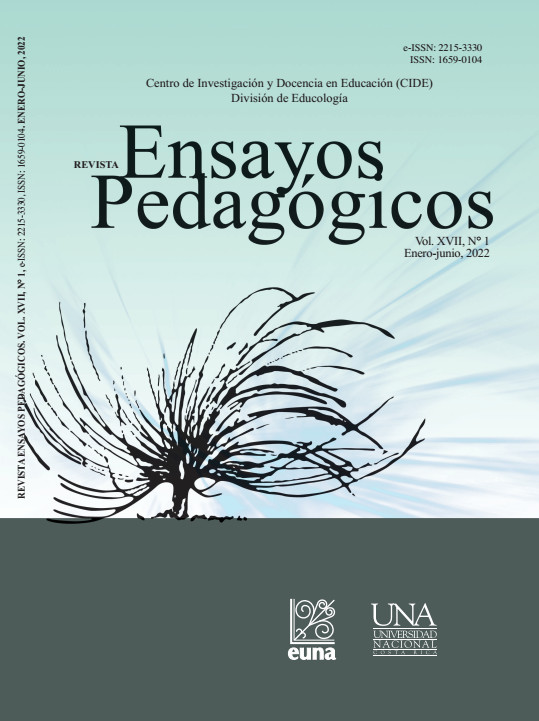Implementation of Oral Production Activities through Remote Learning: A Case Study of EFL Students at Universidad Nacional, Costa Rica
DOI:
https://doi.org/10.15359/rep.17-1.16Palabras clave:
activities, feedback, mediation, pedagogy, planning, remote-learning, scaffoldingResumen
During the school year 2020, as in many other educational settings, classes at Universidad Nacional (UNA), Costa Rica, had to be rapidly transformed and adapted so that the pedagogical mediation process could be changed from the traditional face-to-face or in-class sessions to remote learning. This process, certainly, posed varied challenges in terms of the mediation process and technology-related issues, which had to be addressed efficiently in order to guarantee access to education. In this regard, this article is based on the experience lived with two groups of students taking English as a Foreign Language (EFL) in the course of English II (during the II term of 2020), at Campus Omar Dengo, Heredia, which were taught through remote learning. For this qualitative research, data were collected by means of a closed and open-ended questionnaire in which information related to the oral-production activities implemented during classes was gathered. This instrumental case study concludes with three main statements about the implementation of oral-production tasks: a) planning, b) scaffolding, and c) feedback.
Referencias
Abukhattala, I. (2013). Krashen’s five proposals on language learning: Are they valid in Libyan EFL classes. English Language Teaching, 6(1), 128-131. https://doi.org/10.5539/elt.v6n1p128
Amerian, M., & Mehri, E. (2014). Scaffolding in Sociocultural Theory: Definition, Steps, Features, Conditions, Tools, and Effective Considerations. Scientific Journal of Review, 3(7), 756-765. http://sjournals.com/index.php/sjr/article/view/492
Brookhart, S. (2008). How to give effective feedback to your students. Association for Supervision and Curriculum Development.
Creswell, J. (2012). Educational Research: Planning, Conducting and Evaluating Quantitative and Qualitative Research. Pearson.
Gonulal, T., & Loewen, S. (2018). The TESOL Encyclopedia of English Language Teaching. John Wiley & Sons.
Harmer, J. (2007a). How to Teach English. Pearson Education Limited.
Harmer, J. (2007b). The Practice of English Language Teaching. Pearson Longman.
Hussain, S. (2018). Teaching Speaking Skills in Communication Classroom. International Journal of Media, Journalism and Mass Communications, 3(3), 14-21. http://dx.doi.org/10.20431/2454-9479.0303003
Krashen, S. (2009). Principles and Practice in Second Language Acquisition. Pergamon Press.
Morgan, H. (2020). Best Practices for Implementing Remote Learning during Pandemic. The Clearing House: A Journal of Educational Strategies, Issues and Ideas, 93(3), 135-141. https://doi.org/10.1080/00098655.2020.1751480
Nikolic, V., & Cabaj, H. (2000). Am I teaching well? Self-evaluation strategies for effective teachers. Pippin.
Salih, M., & Yalcin, A. (2018). Feedback preferences of EFL learners with respect to their learning styles, Cogent Education, 5(1), 1-17. https://doi.org/10.1080/2331186X.2018.1481560
Thornbury, S. (2005). How to teach speaking. Longman.
UNA. (2007). Modelo Pedagógico. https://documentos.una.ac.cr/bitstream/handle/unadocs/3084/Modelo%20Pedagogico.pdf?sequence=1&isAllowed=y
Publicado
Cómo citar
Número
Sección
Licencia
La Revista Ensayos Pedagógicos está suscrita a la Licencia Creative Commons Atribución-NoComercial-SinDerivadas 4.0 Internacional, lo cual implica la posibilidad de que tanto las personas autoras como las personas lectoras puedan, de forma gratuita, descargar, almacenar, copiar y distribuir la versión final aprobada y publicada (post print) del artículo, siempre y cuando se realice sin fines comerciales, no se generen obras derivadas y se mencione la fuente y autoría de la obra. Asimismo, la Revista Ensayos Pedagógicos declara que toda persona autora conservará a perpetuidad los derechos de autoría de su ensayo o artículo.









